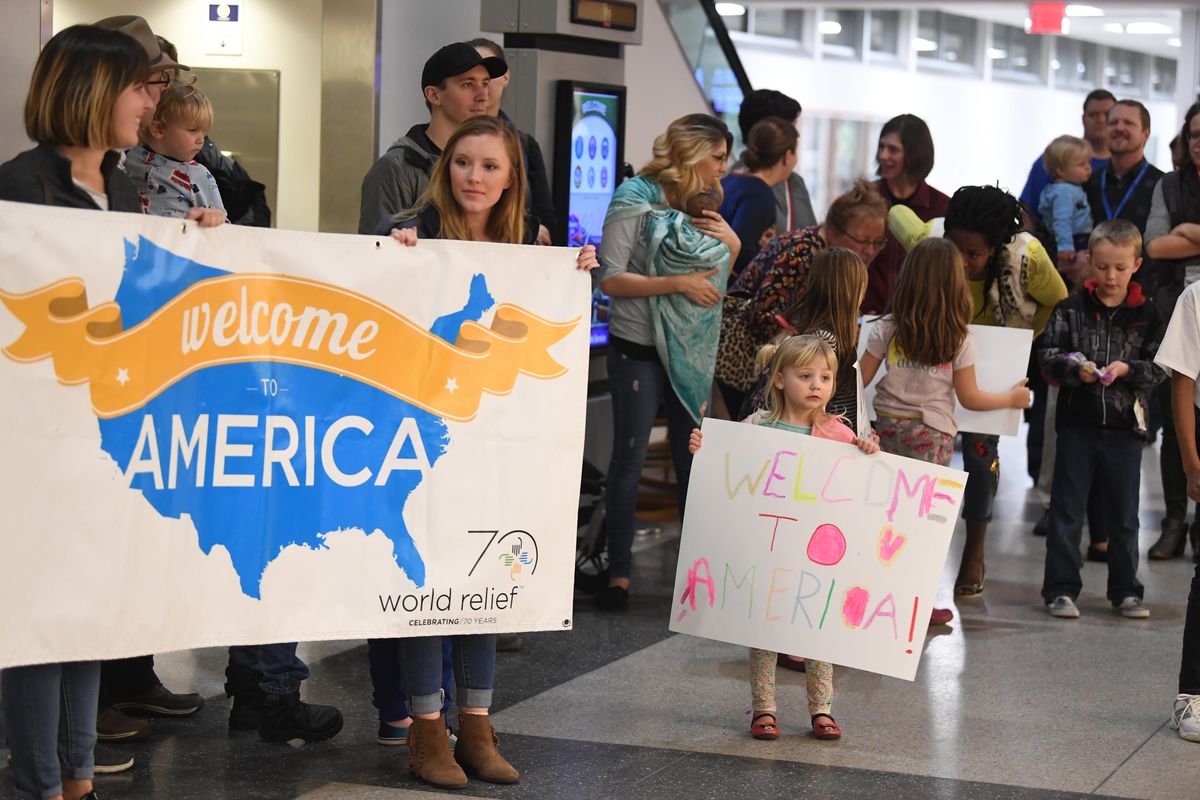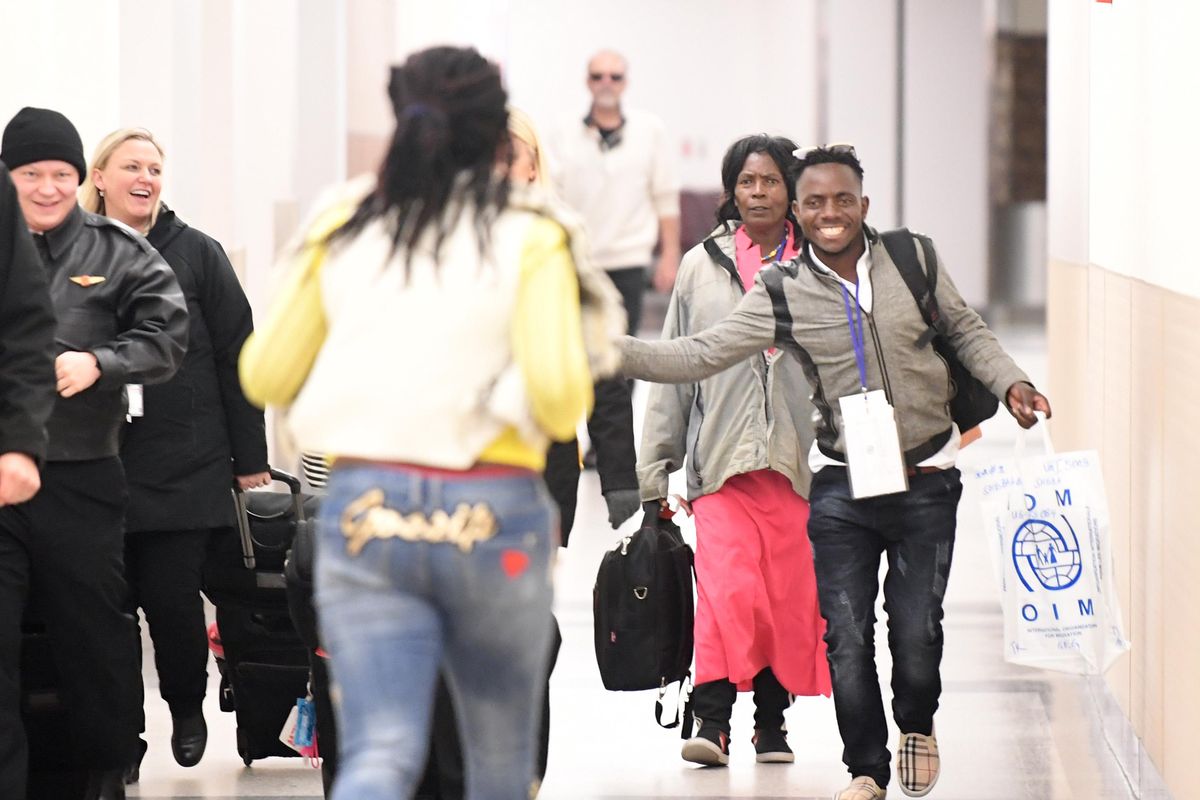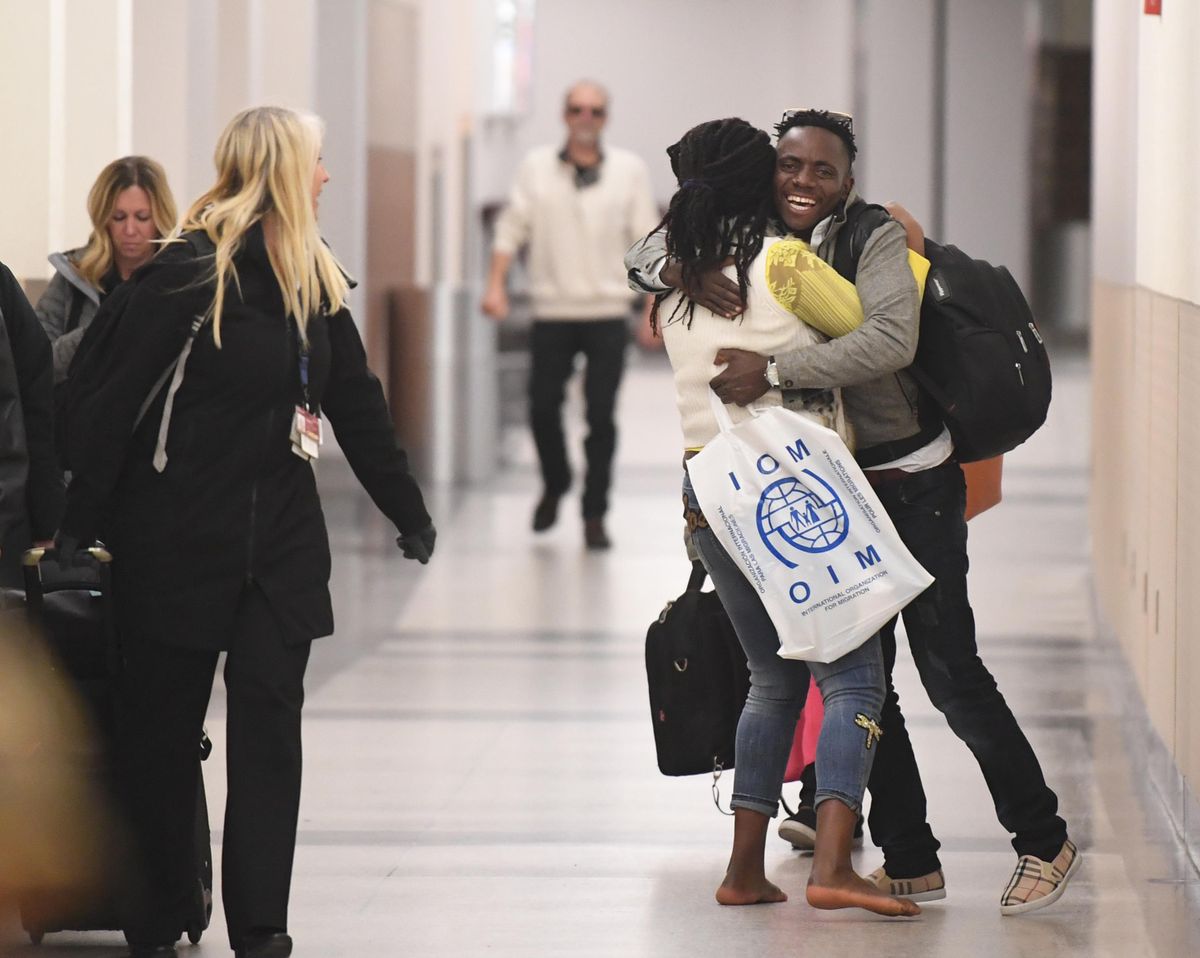After year of separation, Congolese refugee family reunited in Spokane
Mahirwe Solange Kobwa, running at left, rushes to greet her mother, Nyirasafari Madisiyoma, center, in pink, and her brother Sheba Shabagabo, right, in the hallway at Spokane International Airport, Friday, Jan. 19, 2018. Kobwa and her sister, Florance Mawazo, immigrated to America a year and a half ago and have been waiting for their mother and brother to follow them. (Jesse Tinsley / The Spokesman-Review)Buy a print of this photo
As a small crowd gathered at the Spokane International Airport Friday evening, sisters Florance Mawazo and Mahirwe Solange Kobwa hung near the back, somehow inconspicuous despite the bright batik of their clothing. They bobbed to the rhythm of the nearby Neema Youth Choir, clearly enjoying the moment, but still it was impossible to disguise the current of nervous tension running between them.
But when, at the far end of an airport corridor, a woman in a pink dress and a young man in a grey shirt appeared among a crowd of deplaning passengers, that tension snapped like a thread. Solange Kobwa dashed forward, outrunning the crowd, the cameras and even her own shoes to sweep her long-awaited family members into her arms. Mawazo was close on her heels.
For the past year, the two sisters – refugees from the Democratic Republic of Congo who spent nearly two decades in a Ugandan United Nations camp – had been waiting for reunification with their mother, Nyirasafari Madisiyoma, and brother, Sheba Shabagabo. Though initially approved, the process was delayed for close to a year, first by procedural issues and then by the Trump Administration’s 120-day freeze of refugee admissions. That freeze expired in October, but remains in effect for 11 countries, and all new refugees face stronger vetting measures.
Another brother remains in the camp, awaiting clearance from the U.N. High Commissioner for Refugees and U.S. State Department. The family is hopeful they will be able to see him soon.
In many ways, despite the events that drove them to flee first the D.R.C. and then Africa entirely, the family is lucky to be back together. “For the rest of the year, the only people we expect to welcome are direct family members” of previously-settled refugees, said Mark Finney, director of World Relief Spokane.
Previously, roughly half of refugees resettled in the Spokane area came to join their families. That local decline follows a larger trend nationally – an estimate by the Pew Research center found that, due to last year’s refugee freeze and subsequent stricter vetting, the number of refugees taken in by the United States in fiscal year 2017 was likely to be cut by more than half, from previous levels of 110,000 to roughly 50,000.
Along with their mother, the sisters and brothers fled the D.R.C. in 1999, after their father was killed in a political revolution. They found shelter in neighboring Uganda, in the U.N. refugee camp, and there they remained for the next 17 years while their application for asylum was reviewed. “That’s actually close to the average time people wait in these situations,” Finney said.
As it did with the two sisters, the organization will now help Shabagabo and Madisiyoma make a place for themselves in Spokane, assisting them in finding housing and jobs, coaching them in English and connecting them with volunteers from the community who lend advice, companionship and even help navigating Spokane’s wintery roads.
But that work has become more challenging as hostility towards foreign nationals – particularly those from war torn regions in the Middle East and Africa, where hundreds of thousands flee conflict and death – has manifested at the highest levels of government, Finney said.
“To me, it’s heartbreaking,” Finney said, referring specifically to remarks by President Trump last week that the U.S. should no longer welcome migrants from a number of predominantly black nations – nations he refered to, according to multiple sources, as “shithole countries.”
“I’ve been actively communicating with a number of friends from Africa, and for them it’s been deeply painful to feel belittled by somebody in that level of authority, whether that was his intent or not,” Finney said.
Finney said that WRI’s primary motivation in helping others stems from its members’ Evangelical Christian faith, and the bible’s lessons to love each other regardless of creed or country. But there are other, more earthly reasons to help those fleeing conflict, he added – principally, because it grows good will towards the United States internationally.
“We want people to understand how amazing America is,” he said. “We want to share that story with the rest of the world.”
And while reading about negative attitudes or hostile policies in a news story may hurt that message in the short term, he said, “It’s another thing when someone is there to welcome you at the airport, takes you home and makes you dinner.”
As that welcome went on Friday, amidst the choir’s infectious rhythms and many wet eyes, Madisiyoma moved to the side of the crowd, away from the well-wishes and extended hands. Spotting a nearby chair, she slipped down onto it, obviously exhausted but happy.
And no wonder. It had been a long, long journey.







